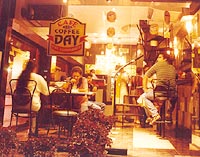|
|
| Help | |
| You are here: Rediff Home » India » Get Ahead » Leisure |
|
| |||||||||||||||||||||||
|
| |||||||||||||||||||||||
 uthor Rana Dasgupta is sitting in a corner of a Cafe Coffee Day located in one of the (relatively) quieter Gurgaon malls, reading passages from his acclaimed debut novel, Tokyo Cancelled.
uthor Rana Dasgupta is sitting in a corner of a Cafe Coffee Day located in one of the (relatively) quieter Gurgaon malls, reading passages from his acclaimed debut novel, Tokyo Cancelled.
 Gathered around him in a semi-circle is a goodly crowd of literary journalists and publishing house representatives. Dasgupta gets into the flow of the reading-cum-discussion soon enough.
Gathered around him in a semi-circle is a goodly crowd of literary journalists and publishing house representatives. Dasgupta gets into the flow of the reading-cum-discussion soon enough.
But it isn't all smooth going; more than once he has to look around and ask if it is a good idea to continue.
It isn't always easy for the audience to hear him, what with the noise filtering in from other parts of the coffeehouse. During a particularly intense passage, an overheard television set switches on diabolically.
In another small coffeehouse in south Delhi, Himanshu Verma, who recently launched a project to revive the literary pamphlet, has arranged a discussion for 15 to 20 people.
It starts off well but soon hitches develop; the coffee house is a commercial space and has to cater to its regular customers, so Verma's request for mellow jazz music isn't granted.
It's made obvious, as tactfully as possible, that the group is taking up too much time and space and will have to pay a cover charge in future.
The literary discussion. The coffee house. It's a connection that goes back to 17th-century Europe, where literary forms like the pamphlet, the broadside -- and, eventually, even the novel -- developed around discussions held over cups of the stimulating brew.
"Many of the leading men of letters even had their mail -- including feedback on articles and essays -- addressed to them at caf�-houses," says Verma. "There are stories of newspaper editors having makeshift offices inside cafes."
Cut to the urban spaces in modern India. One sees the hint of a revival, or at least an attempt to create a new synergy. The number of book discussions and readings taking place in coffeehouses is increasing. But how feasible is this trend in a milieu where coffeehouses are commerce-driven?
Despite the occasional awkward experience, Dasgupta thinks it's worth the effort. "This city doesn't have enough idea-oriented conversation," he says tersely, "so it's good that at least attempts to hold such discussions in public places are being made. Of course, it would be nicer if it were possible to keep the noise levels down -- many of the coffeeshops in Delhi have bad acoustics, which is a problem."
Priya Jaggi of EBD Book Cafe, which organised the Tokyo Cancelled reading, is enthusiastic too. "We have already organised many such events, including a discussion where the topic was the poetry of Rumi," she says, "Indians love to huddle together and talk, it runs through our veins."
But Verma is much less optimistic after his experiences, going so far as to say that he'd rather tie up with dhaba-sized tea stalls like the ones outside the National School of Drama and NIFT.
"When we asked commercial coffee houses to display our pamphlets -- which should be of interest to their customers -- we were asked to pay advertising rates," he says ruefully.
"There are many points of synergy between bookshops and coffeehouses, but there are conflicts too," says Aalok Wadhwa of The Corner Bookstore, which has a tie-up with Barista but organises its events mainly in the bookstore itself.
"For any coffeeshop, losing tables is a very important issue. One has to plan events accordingly so that they aren't at peak hours, and perhaps also make use of outdoor seating when there's flexibility of space."
The popular view seems to be that literary events in commercial spaces work best when the cafe is incidental to the bookshop, rather than the other way round.
Take Cafe Turtle, on the top floor of Full Circle bookshop in Delhi's Khan Market, which has become a hub for various cultural events ranging from poets' gatherings to book launches.
Shekhar Malhotra, who owns the shop and the cafe, believes the concept has worked because "the bookshop is our main line of work and the coffeeshop comes second".
Which means, when literary events are held, the cafe is closed to regular customers and space used only for the event. "But you wouldn't see that happen in a place where selling coffee is the main line of business," he says.
Rajiv Choudhury, COO, The Oxford Bookstore, agrees. The bookshop famously has a Cha Bar located within the store where customers can go through books over cups of tea.
"This works because the tea space is a part of the book-selling space," says Choudhury. "When it is the other way round, you'll find a couple of racks selling a whimsical selection of books that aren't even arranged in an organised way. That sort of thing isn't for the serious book reader."
Powered by
|
|
| © 2008 Rediff.com India Limited. All Rights Reserved. Disclaimer | Feedback |